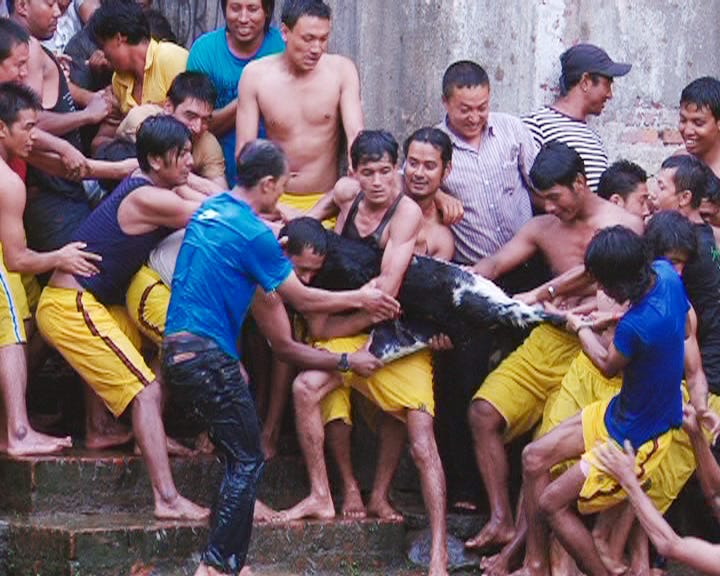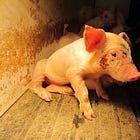
Khokana is a village on the outskirts of Kathmandu, Nepal.
Today, I have an important message for its residents — and for anyone around the world interested in the well-being of animals. It’s a simple prediction.
While I will focus on a striking event happening in Khokana right now, you’ll see that the issues at hand are not confined to any one location; they are part of broader patterns affecting all parts of the world.
This post is not a message of condemnation but of hope and collective responsibility. While the content may be very explicit, it is genuinely not my intention to demonize or assign blame, but to provoke thought and inspire change.
Most importantly, none of the following is about comparing Khokana to other places or judging one region against another. It is a wake-up call to address urgent issues that transcend borders and concern communities everywhere.
My prediction
Dear people of Khokana,
In the not-too-distant future, a time will come when you look back with horror and disbelief at a tradition still celebrated in your village today.
I’m talking about the Deopokhari festival, where a terrified baby goat is tormented by nine men, fighting to be the ‘hero’ of conquering the animal as an offering to the goddess, Rudranayani. The screaming goat is dragged, beaten, strangled, bitten, ripped apart by bare hands, and drowned alive. This ordeal lasts for almost an hour.
Viewer discretion is advised.
There will come a time when you, the people of Khokana, will be united in the conviction that there is no place for such practices in a compassionate society. That there is nothing ‘heroic’ about inflicting such suffering on a defenceless creature.
The mere memory of this tradition will send shivers down your spines. While the past cannot be erased, you won’t allow it to have been in vain — you will turn the page and actively advocate for the very animals that once suffered. You will build a beautiful memorial for the victims, which will stand for many centuries and serve as a testament to your compassion, growth, and wisdom.
You will transform the darkest sides of your past into a source of strength. You will learn from these mistakes and become pioneers in the animal liberation movement within Nepal and beyond. You will be a shining example of how a community can evolve beyond harmful traditions, embracing empathy and respect for all living beings, and setting a new standard for future generations.
In a world that is gradually going through a similar transformation, your insights and leadership will be in demand internationally. The name “Khokana” will become synonymous with courage in confronting and overcoming past injustices, bringing praise and prosperity to your people.
Just as the priest in your town’s legend, who was wrongly believed to be dead and placed on a pyre, was miraculously saved from the flames by a sudden storm, Khokana will rise from the shadows of its past with renewed strength and purpose, symbolizing a powerful rebirth and transformation.
“The time has come to replace killing and violence with peaceful worship and celebration.”
— Ram Chandra Shah
Tradition is no excuse for animal abuse
Using tradition to justify needless violence is a clear misuse of tradition. Just because humans have celebrated a cruel ritual for a long time does not make it morally justifiable today.
In the past, our traditions included barring women from voting, enslaving people, and believing the Earth was flat. Humanity has repeatedly entered new eras of understanding, recognizing the grave mistakes of the past.
I’m no enemy of traditions. But our love for traditions shouldn’t blind us to fundamental values and principles that must evolve as our understanding of the world grows. For more, see my recent article on the topic:
TAKE ACTION
Please sign this urgent petition to end Nepal’s Deopokhari animal sacrifice festival: https://actionnetwork.org/forms/urgent-petition-end-nepals-deopokhari-animal-sacrifice-festival

We are no better.
While the cruelty seen in the Deopokhari festival may seem shockingly severe, it's crucial to understand that similar forms of brutality happen all across the globe.
Many people who react with horror to isolated instances of animal cruelty will, in the next breath, purchase products from industries that perpetuate animal abuse on an immense scale.
Let’s not kid ourselves. The conventional animal industries, including meat, dairy, and egg production, are often just as brutal and merciless and they affect a vastly greater number of animals.
Every 30 minutes, as many animals are killed for human consumption as people have died in the six years of the Second World War — the deadliest conflict in human history. Hundreds of millions of land animals are killed for food every single day. The number of sea animals killed per year is estimated to be 1 trillion to 2.8 trillion (and fish feel pain, too).
Just as it would be ethically indefensible to insist on cruel practices like cockfighting, dogfighting, or bullfighting, it is equally unjustifiable to continue consuming animal products despite their atrocious impact on animals, humans, climate, and our environment.
Events such as the Deopokhari festival can serve as a powerful reminder for us to examine and address the practices of animal abuse happening closer to home.
This isn’t about guilt
None of us, whether in Khokana or anywhere else, can choose where we are born. I certainly don’t blame anyone for being raised within a particular cultural context, but as adults, we have a responsibility to critically examine the rituals and traditions passed down to us and consider whether they remain justifiable today — especially when they involve intense violence against sentient beings. This applies equally to traditions like Thanksgiving, Christmas dinners, and the Deopokhari festival, as well as our everyday habits of consuming, wearing, and using animals for entertainment.
A note on language
This post isn’t available in Nepalese — yet.
Naturally it is not my goal to speak about the people of Khokana behind their backs. I’m in the process of contacting local animal rights organizations to make sure this article is properly translated and can be accurately communicated to the local community.
I’m don’t expect a response. But my prediction stands.






Commenting from /r/Nepal.
It's truly saddening to see something so barbaric happening amidst us at this day and age. I may not see eye-to-eye with a vegan movement, but I also think it's too inhumane for the animal that'd prefer to "get it over with" instead of being mangled around.
Ooof.
Thank you for this post.